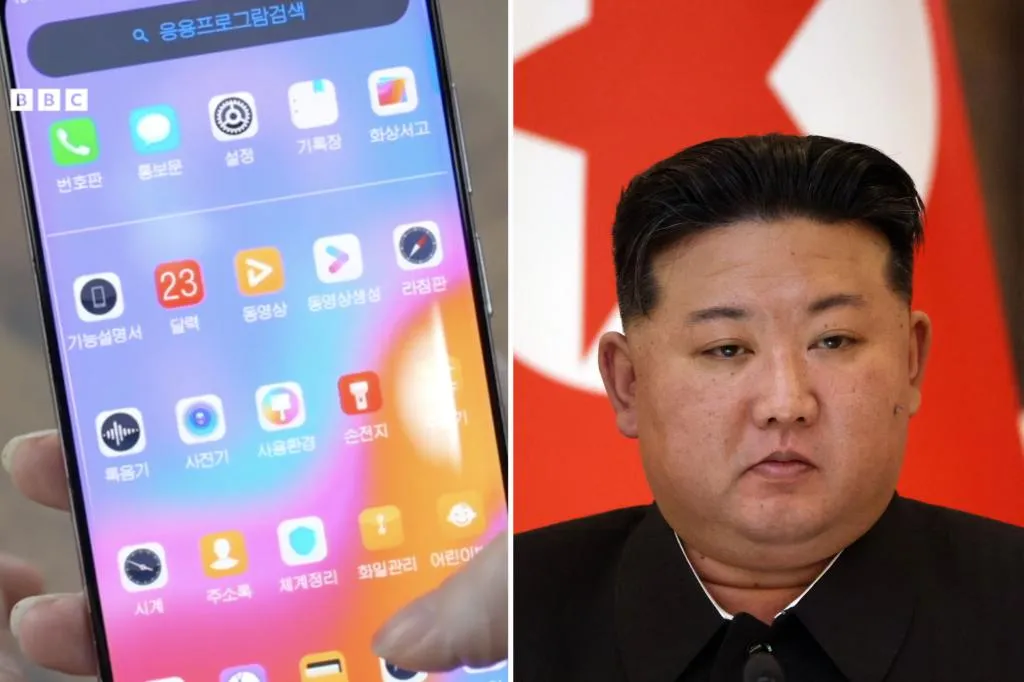A smartphone smuggled out of North Korea has revealed the astonishing levels of control the secretive dictatorship is exercising over its people.
The phone, which from the outside appears no different from a normal device, issued warnings about using South Korean slang words to users, and auto-corrected "South Korea" to read "puppet state," an investigation from the BBC found.
It would also covertly take a screenshot every five minutes, storing the images in a secret folder which the user couldn't access, but which presumably were accessible to North Korean authorities.
When the user tried to type in the word "oppa," which means older brother in Korean, but has come to be used to refer to a boyfriend in South Korean slang, the phone would auto-correct the word to the more communist-friendly alternative, "comrade."
A warning would then flash up, warning the phone's user that the term "oppa" could only be used for older siblings, the BBC investigation found.
The bizarre Orwellian practices with a 21st-century twist were revealed after Daily NK, a Seoul-based media organization, secretly smuggled the North Korean cell phone out of the country late last year.
It is only the latest example of a draconian clampdown on modern technology by Kim Jong Un's authoritarian regime, revealing that the dictatorship may be winning the battle of the tech world.
"Smartphones are now part and parcel of the way North Korea tries to indoctrinate people," Martyn Williams, a senior fellow at the Washington DC-based Stimson Center, and an expert in North Korean technology and information, told the BBC.
North Korea is now "starting to gain the upper hand" in the information war, he warned.
In other signs of a hardening of the rules, using South Korean phrases or speaking in a South Korean accent were officially made a state crime by Kim in 2023.
Members of "youth crackdown squads" are seen patrolling the streets, monitoring the behavior of young North Koreans.
North Korean dissident, Kang Gyuri, 24, told the BBC she would be stopped and reprimanded for styling her hair and dressing like a South Korean. She escaped the hermit regime by boat in 2023 and now lives in South Korea.
Kang said goon squads would also confiscate her phone and read her text messages to check for any forbidden South Korean terms.
This tougher approach from Kim's regime is in response to the efforts of the South Korean government to spread subversive messages north of the border and open the eyes of the North Korean people to how drastically different life is in the South.
While all outside newspapers and TV channels are banned in the North, a small number of broadcasters have been able to secretly transmit information into the country late at night via short and medium radio waves.
Thousands of USB sticks and micro-SD cards containing South Korean dramas and K-pop songs are also smuggled over the border every month, often hidden inside boxes of fruit.
Much of this work is funded by the US government, with some warning that recent aid cuts by President Trump could risk giving Kim the upper hand.
"The reason for this control is that so much of the mythology around the Kim family is made up. A lot of what they tell people is lies," Martyn Williams said.
For dissidents such as Kang, her first exposure to the outside world was via some of these illicit radio broadcasts and K-dramas, which led to her desperation to get out of the communist dystopia.
"I felt so suffocated, and I suddenly had an urge to leave," she said.
"I used to think it was normal that the state restricted us so much. I thought other countries lived with this control. But then I realized it was only in North Korea," she said.
